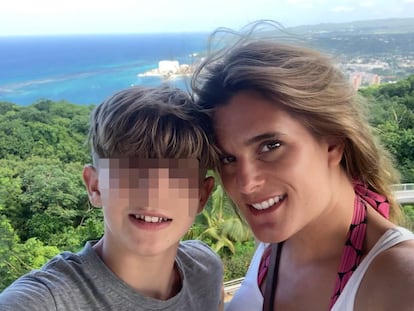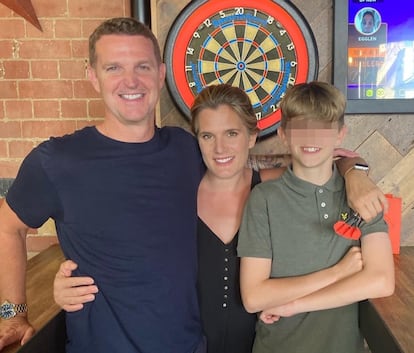‘I just want to understand why he died’: A mother’s battle to find out if social media played a role in her son’s final days
Jools Sweeney, 14, took his own life in 2022. Since then, his family has been trying to find out what influence his online activity may have had on his decision

In April 2022, Ellen Roome found her 14-year-old son Jools dead in his bedroom in Cheltenham, England. She didn’t know what had happened. Two years later, she still doesn’t know. For months, Roome has been fighting big tech companies, calling on the firms to be quicker and more transparent in sharing data about her son, a minor, because she believes his online activity may have played a role in his decision. Her case could now change British laws on privacy and data retention.
Amid the shock of her son’s death, Roome did not even consider that social media might have played a role: “We let the police do their investigation,” she told EL PAÍS over the phone. But that police investigation was unsuccessful. They did not classify the death as suicide because they were unable to prove he was in a “suicidal mood.” On the night of the death, Roome asked the police to use Jools’ face to establish a new pin and gain access to his cell phone. The officers responded that they were not going to tamper with the evidence. Police have forensic machines to break security and gain access to cell phones. But, according to Roome, the machine in their district was broken. They only accessed the phone months later, when a friend of Jools guessed the password.

After looking at “elements” on the phone, the investigating officer concluded that there was “nothing to worry about.” But Roome doesn’t believe that statement puts to rest all the questions she has about what might be on Jools’ phone: “I don’t feel it was done properly or that all the accounts were checked,” she says.
Jools’ family only discovered over time that the teenager had accounts on apps they didn’t know about, such as Discord (a messaging app focused on video games) or that he had secondary accounts on Instagram and TikTok. The case illustrates big tech’s increasingly important role in our lives, and how legislation has not yet caught up to address all the issues related to this influence.
After the police’s failure, Roome’s battle began, and she still doesn’t understand why it’s so difficult for Meta and TikTok to give her what she needs to clarify the possible motives of her son’s death. Roome says she was “extremely surprised” when they didn’t give her the information she asked for. For her, a mother grieving for a dead son, the choice was easy: “If I had been the owner of Meta or TikTok, I would have said, ‘what information do you want? Here you have everything and I hope you find some answers,’” she says.
That’s not what happened: “I don’t understand how a company can have no morals,” she continues. “As parents, we just want to understand the decision of our son, who was completely normal, wasn’t bullied offline, didn’t show signs of depression that anyone noticed, and didn’t have mental health issues unless he hid them. There were 500 people at his funeral; he was a popular, intelligent kid. I just want to understand why he decided to hang himself one day.”
Neither TikTok nor Meta have clarified their position in the case to EL PAÍS. A spokesperson for Meta told The Independent newspaper in June: “We are in touch directly with Ms Roome and will cooperate fully with any law enforcement investigation, including responding to any data requests.”
Meta has finally given her the data, Roome explains, but in an incomprehensible technical format. Now a forensic expert is reviewing it and then a clinical psychologist will try to detect something that could explain Jools’ behavior: “But they didn’t give me his messages or his browsing data. There are things that he liked and I still haven’t received the full report,” she says.
She even had a video conference with TikTok, but to no avail: “It was useless,” she says. They told her that they had deleted data after a year, or on other occasions that it was deleted during the year. “I told them that a company of their size should have a policy about when they delete data like that,” she says. Roome adds that an insider contacted her to tell her that the company kept everything in a place with a “different type of access.” Legislation requires large technology companies to delete personal data that is no longer necessary for their operation: that would be a reason to hide it with a “different access.” “I don’t believe anything they tell me,” says Roome.
After the companies failed to respond, she turned to politics. In the U.K., Parliament must debate a citizen petition if it receives 100,000 signatures. Within two weeks, Roome’s petition — called Giving parents/guardians a right to access social media accounts of their children — was signed by 126,000 people. On August 20, the U.K. Department of Science, Innovation and Technology responded in detail about the changes they have included in the new Online Safety Act. In the response, the government responded that the new legislation strengthens coroners’ ability to obtain information from online services, and ensures that these services respond quickly and transparently to parent inquiries. “These services will have to set out policies on disclosing information to parents regarding the online activities of a deceased child in a clear, accessible and sufficiently detailed format in their terms of service,” the government says in its response.
But that is no longer enough for Jools. Her only option is to ask a higher court to force the police to reopen the case and have a judge request this information from the tech companies. But that will cost a lot of money. The family have started a GoFundMe campaign to raise more than €90,000 ($100,000): “Jools decided to end his life at the age of 14. It may not be because of social media, but as a mother, I feel that I should have a human right to explore all options to seek answers as to why my son is no longer here. This includes forcing social media companies to hand over all data about children. How can our children sign terms and conditions at the age of 13 when we are the adults responsible for them, and yet we still have no right to see anything?” she explains.
Roome also wanted parents to be able to access the data of their living children, but believes that there should be more limits in this regard: “I accept that there are certain rights of privacy for children who are alive, and that needs further discussion with experts on the subject,” she says.
Searching for information on how to request a deceased relative’s data from Meta and TikTok is still a bit of an odyssey. The TikTok help center doesn’t even list the issue. Facebook offers a request form, but warns that users to expect delays “because of the coronavirus (Covid-19) pandemic,” and that it “may take us additional time to memorialize or delete the account you requested.”
Big tech companies have little incentive to cooperate if they are not required to do so by law. Why would they reveal that they may have played a role in the death of a teenager? “They will ask for death certificates, family books or the will [if the person is of legal age],” says Sergio Carrasco, a lawyer specializing in technology. “If they see something strange, the network’s legal department will tell you to go to a judge. They will ask you for a lot of justification.”
In 2022, a court targeted Meta and Pinterest in the case of the suicide of Molly Russell, also aged 14.
Sign up for our weekly newsletter to get more English-language news coverage from EL PAÍS USA Edition
Tu suscripción se está usando en otro dispositivo
¿Quieres añadir otro usuario a tu suscripción?
Si continúas leyendo en este dispositivo, no se podrá leer en el otro.
FlechaTu suscripción se está usando en otro dispositivo y solo puedes acceder a EL PAÍS desde un dispositivo a la vez.
Si quieres compartir tu cuenta, cambia tu suscripción a la modalidad Premium, así podrás añadir otro usuario. Cada uno accederá con su propia cuenta de email, lo que os permitirá personalizar vuestra experiencia en EL PAÍS.
¿Tienes una suscripción de empresa? Accede aquí para contratar más cuentas.
En el caso de no saber quién está usando tu cuenta, te recomendamos cambiar tu contraseña aquí.
Si decides continuar compartiendo tu cuenta, este mensaje se mostrará en tu dispositivo y en el de la otra persona que está usando tu cuenta de forma indefinida, afectando a tu experiencia de lectura. Puedes consultar aquí los términos y condiciones de la suscripción digital.









































